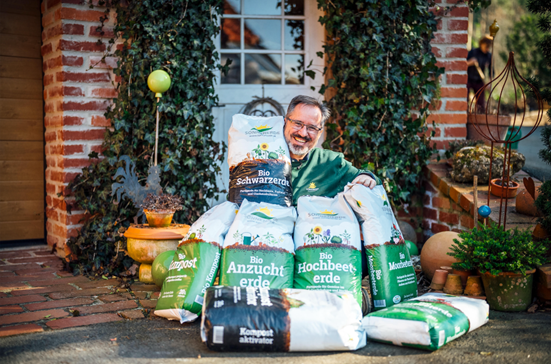
Biochar: The Key to Sustainable Agriculture and CO₂ Sequestration
How Sonnenerde and Carbon Standards International are driving climate action

Fertile soil is the foundation of food security and plays a critical role in climate protection. Yet soils worldwide are deteriorating due to intensive farming, erosion, and climate change. There is, however, a breakthrough solution: high-quality biochar can preserve soil fertility and even regenerate degraded land—while also locking away CO₂ for the long term. Biochar is produced by heating biomass—such as wood waste, agricultural residues, or nutshells—at high temperatures in the absence of oxygen through a process called pyrolysis. Indigenous communities in Brazil have used this technique for centuries to create rich, fertile soils. When added to soil, biochar improves water and nutrient retention, supports soil life, and helps reduce greenhouse gas emissions.
Creating a sustainable biochar economy involves several players. Producers make high-quality biochar and blend it into potting soil or other products. Certification bodies like Carbon Standards International (CSI) verify that the biochar is produced to the highest standards and that it effectively stores carbon in the long term. Companies and organisations then purchase this certified biochar or incorporate it into their products. At the same time, climate protection certificates are created: those who produce and apply biochar can sell the verified amount of stored CO₂ as certificates. Businesses or individuals looking to offset their carbon footprint can buy these certificates, directly supporting the sustainable use of biochar. The result is a growing market that improves agricultural soils and tangibly contributes to tackling climate change.
Sonnenerde is based in Riedlingsdorf, Austria and ranks among the leading producers of high-quality biochar products. Founded by Gerald Dunst in 1998, the company focuses on enhancing soil fertility through sustainable innovation. More information can be found at www.sonnenerde.at.
To ensure that biochar serves as a recognised method for long-term CO₂ storage beyond its agricultural use, clear and reliable standards are essential. Carbon Standards International plays a key role in this effort.
CSI guarantees that biochar is registered as a scientifically validated carbon sink (C-sink) in the official C-Sink Registry and meets the highest production standards. This provides companies, investors, and farmers with access to credible CO₂ certificates.
From Compost to Biochar: Sonnenerde’s Mission
Gerald travelled across Europe for many years as a composting consultant. He saw the same issue again and again: most industrial composting facilities focused on disposing of large volumes of plant waste rather than improving soil fertility—with negative consequences for both compost quality and the environment.
„Many operators treated composting as waste management rather than a way to build healthy, fertile soil—and that shocked me. To me, compost has always been about supporting soil life. But as a consultant, no one wanted to hear it, so I thought: I’ll show them how it’s done.” — Gerald Dunst, Founder of SonnenerdeGerald’s turning point came during a conference in Brazil, where he discovered the Amazonian technique of Terra Preta—a traditional method for enriching soil that has been used for thousands of years. Inspired, he began a series of scientific trials to develop the ideal mix of materials for fertile soil using biochar.
Biochar: More Than Just CO₂ Storage
Biochar offers a wide range of benefits for both agriculture and the environment:- Water retention: Soils enriched with biochar hold water much longer—an advantage in both drought and flood conditions.
- Nitrogen stabilisation: Biochar helps keep nitrogen in the soil rather than allowing it to escape into the atmosphere as a greenhouse gas.
- Support for soil biology: Its porous structure provides an ideal habitat for microorganisms, leading to the formation of humus and long-term improvements in soil fertility.
- Carbon storage: The carbon stabilised through pyrolysis remains locked in the soil for centuries.
Why Adhering to Standards Is Essential for Climate Impact
For biochar to be economically viable, robust standards for CO₂ storage are essential. Climate impact refers to any action that actively reduces or removes CO₂ from the atmosphere through processes that achieve lasting carbon removal. To be recognised, such efforts must be transparent, measurable, and verifiable.Carbon Standards International (CSI) and the certification of products ensure that companies like Sonnenerde can reliably offer their biochar and CO₂ certificates on the market. These certificates make climate impact economically usable by allowing businesses and organisations to offset their carbon footprint.
Only when climate action becomes financially attractive can it scale and contribute meaningfully to tackling climate change in the long term.
„Without certification, you have no chance in the market. Companies and individuals who buy CO₂ certificates need independent verification to be sure that real reductions are being achieved.” — Gerald Dunst
Working with CSI has led Sonnenerde to implement even stricter quality controls:
- Detailed documentation of each production batch
- Regular laboratory testing of raw materials
- Consistent compliance with CO₂ certification standards
Case Study: Greening the Desert in Saudi Arabia
A project in Saudi Arabia shows how biochar performs even in extreme climates. A traditional date palm plantation is being transformed into a sustainable permaculture system.- Biochar improves the soil’s ability to retain water.
- Plants develop greater resistance to drought.
- Nitrogen fertiliser is absorbed more effectively, enhancing long-term soil fertility.
